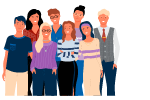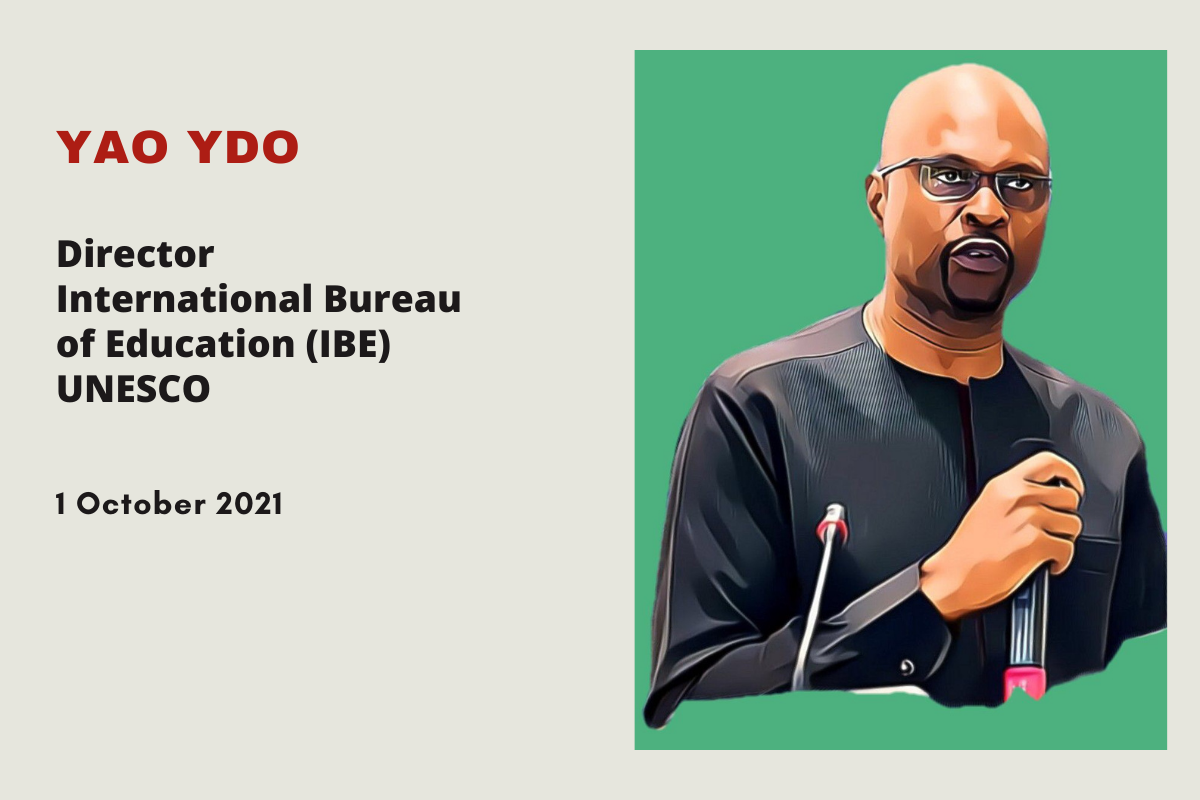The Interview | Yao Ydo
 | Could you tell us briefly what your organization does? What is your role? What is your goal? |
The International Bureau of Education (UNESCO-IBE) is a UNESCO institute specializing in curriculum issues. We work with Member States to strengthen their capacities to design, and implement contextualized curricula that reflect their national aspirations and ensure a quality education for all.
The main objective of UNESCO-IBE is to serve as the global reference for knowledge-sharing and production, technical assistance, dialogue and cooperation on the curriculum and related matters.
We take a systemic, cross-sectoral view of curriculum that promotes the development of 21st-century skills. Among others, we emphasize the importance of transversal skills and the integration of science and new technologies into curricula, in order to equip learners with the skills they need to fully engage in our complex and fast-changing world.
One of our main missions is to ensure that we carry out our mandate, which has been renewed by UNESCO, and to work closely with ministries of education to develop and adopt high-quality, inclusive educational programs as part of reforms or adjustments to their curricula, a process that has begun in many countries in response to the impact of COVID-19 on education.
 | Among the concentration of actors in Geneva (OIs, NGOs, permanent missions, academia, and the private sector), who do you work with and how? |
The International Bureau of Education was founded in 1925 by a group of leading psychologists and educators, several of whom were from Geneva, to serve as a centre of excellence in comparative education. So, there is a natural connection between IBE and the Geneva ecosystem.
Immediately after I came on board last year, we organized a meeting with decision-makers and representatives of more than 10 Swiss education authorities, multilateral organizations and academic institutions. It was the first meeting between IBE and its international Geneva partners since 2017. One session was opened by Mr. Martin Michelet, the Ambassador of Switzerland to UNESCO at the time. Also joining the discussion were the Swiss Agency for Development and Cooperation (SDC), the Permanent Mission of Switzerland to the United Nations Office in Geneva, the Swiss Conference of Cantonal Directors of Public Education (CDIP), the Federal Department of Foreign Affairs (FDFA), the University of Geneva, NORRAG and the Swiss Network for Education and International Cooperation (RECI). We have been in regular contact with all these partners since.
Following that event, we further expanded our partnerships with the International Geneva community in close collaboration with the UNESCO Liaison Office in Geneva. To mention just a few, we are working with the International School of Geneva (Ecolint) to develop a Universal Learning Program (ULP). We have agreed to collaborate with the Education in Emergencies (EiE) team at UNESCO on the launch of the Geneva Global Hub for Education in Emergencies. We have close links with the Geneva School of Diplomacy and International Relations (GSD), the Diplomatic Circle of Geneva, the city of Lausanne's SYNI program and Graines de Paix.
In a different vein entirely, we are supporting research carried out by the University of Geneva on the history of the International Bureau of Education of UNESCO and the famous Swiss psychologist Jean Piaget, a founding member of the Bureau.
Lastly, the Bureau’s library contains a vast collection of publicly accessible archival documents and rare books on educational topics, from policy to curriculum development and teaching methods. This is an exceptional legacy as well as a rich store of information.
 | What are the strengths and weaknesses of Geneva with regards to the development of your activity? |
Geneva is known first and foremost as the home of many international organizations. Its ecosystem comprises many of the biggest actors in the development world. Geneva embodies the humanitarian and international facet of multilateral diplomacy. In my view, it illustrates the notion of "soft power." There is a well-known saying that "the thinking happens in Geneva, the decisions are taken in New York."
Education is widely recognized as an important element of soft power. Geneva plays an invaluable role as a platform for connecting with other international organizations, NGOs and associations active in the field of education.
As part of the implementation of Sustainable Development Goal 4 (SDG4), UNESCO-IBE aims to build on the huge potential of this Geneva ecosystem. The Bureau’s strategic location has helped us strengthen our interdisciplinary and intersectoral vision of education. It has also enabled us to establish our global leadership in curriculum-related issues.
Lastly, Geneva is an attractive city and a great place to live, although the high cost of living is a drawback for many visitors, especially those from developing countries.
 | What do you think global governance should look like 20 or 30 years from now? |
World governance will have to adopt two central values in the next 20 to 30 years: cooperation and innovation. That will help ensure that the actions of future governments will help to shape a world where tolerance, fraternity, and solidarity can thrive, and people can live together in peace.
The Covid-19 pandemic has highlighted the relative importance of material goods versus human values. The fragility of our systems, despite their complexity, was obvious, in contrast with the powerful bonds that connect us to each other. The global health crisis revealed where these connections lie and demonstrated the symbiotic relationship that unites all people.
The challenges facing humanity, such as climate change and access to education, are global issues that call for global solutions. We will be powerless to address them unless we work together diligently. Global governance will need to integrate stronger mechanisms for collaboration so that all nations take responsibility for responding to these challenges.
On the topic of cooperation, for example, in 2020, UNESCO launched the Global Education Coalition, a knowledge-sharing platform that supports the right to education during and after the Covid-19 pandemic. The coalition brings together 175 members of the United Nations family, civil society, academia, and the private sector to guarantee learning continuity in times of crisis, like the one we are experiencing right now.
As a UNESCO Category 1 Institute, UNESCO-BIE sets the benchmark in curriculum innovation by being proactive and exploring emerging technologies and trends in education. That is the purpose of our recently launched Hybrid Education, Learning and Assessment (HELA) project, which is based on the idea that in-person and distance learning are complementary and should be integrated with each other. We support these hybrid learning models, which imply new forms of dialogue and the inclusion of education in collective social policy development. This is a fantastic opportunity to rethink the relationship between schools, teachers, pupils, communities, and families, who played an active role in managing this crisis. This model also encourages us to think deeply about what education could look like, today and in the future, and how to foster an enduring sense of global citizenship, so that the next generations are better equipped to understand each other and shape their shared destiny while preserving the environment and the planet.
